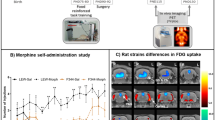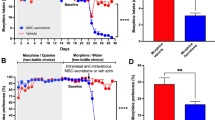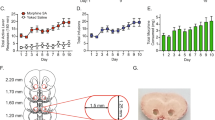Abstract
THERE is as yet no satisfactory explanation for the phenomenon of drug addiction. Morphine-induced biological dependence of a type which might be the basis of addiction in higher animals has not been demonstrated in unicellular organisms which have metabolisms independent of nervous or hormonal control, and no convincing explanation for such induced dependence arises from knowledge of the effects of morphine on the nervous system alone. There is little doubt that the chemical basis of addiction involves hormonal systems, and we further suspect that the site of addicting action may lie in mechanisms whereby hormonal effects are super-imposed on the more primitive, intrinsic controlling mechanisms of cellular metabolism.
This is a preview of subscription content, access via your institution
Access options
Subscribe to this journal
Receive 51 print issues and online access
$199.00 per year
only $3.90 per issue
Buy this article
- Purchase on SpringerLink
- Instant access to the full article PDF.
USD 39.95
Prices may be subject to local taxes which are calculated during checkout
Similar content being viewed by others
References
Gemmill, C. L., Bull. Johns Hopk. Hosp., 66, 232 (1940).
Gemmill, C. L., Bull. Johns Hopk. Hosp., 68, 329 (1940).
Verzár, F., and Wenner, V., Biochem. J., 42, 35 (1948).
Leupin, E., and Verzár, F., Biochem. J., 46, 562 (1950).
Good, C. A., Kramer, H., and Somogyi, M., J. Biol. Chem., 100, 485 (1933).
Nelson, N., J. Biol. Chem., 153, 375 (1944).
Author information
Authors and Affiliations
Rights and permissions
About this article
Cite this article
LEE PENG, C., WALSH, E. Effects of Morphine on Uptake of Glucose and Synthesis of Glycogen in Muscle of Normal and Chronically Morphinized Rats. Nature 196, 171 (1962). https://doi.org/10.1038/196171a0
Issue date:
DOI: https://doi.org/10.1038/196171a0



